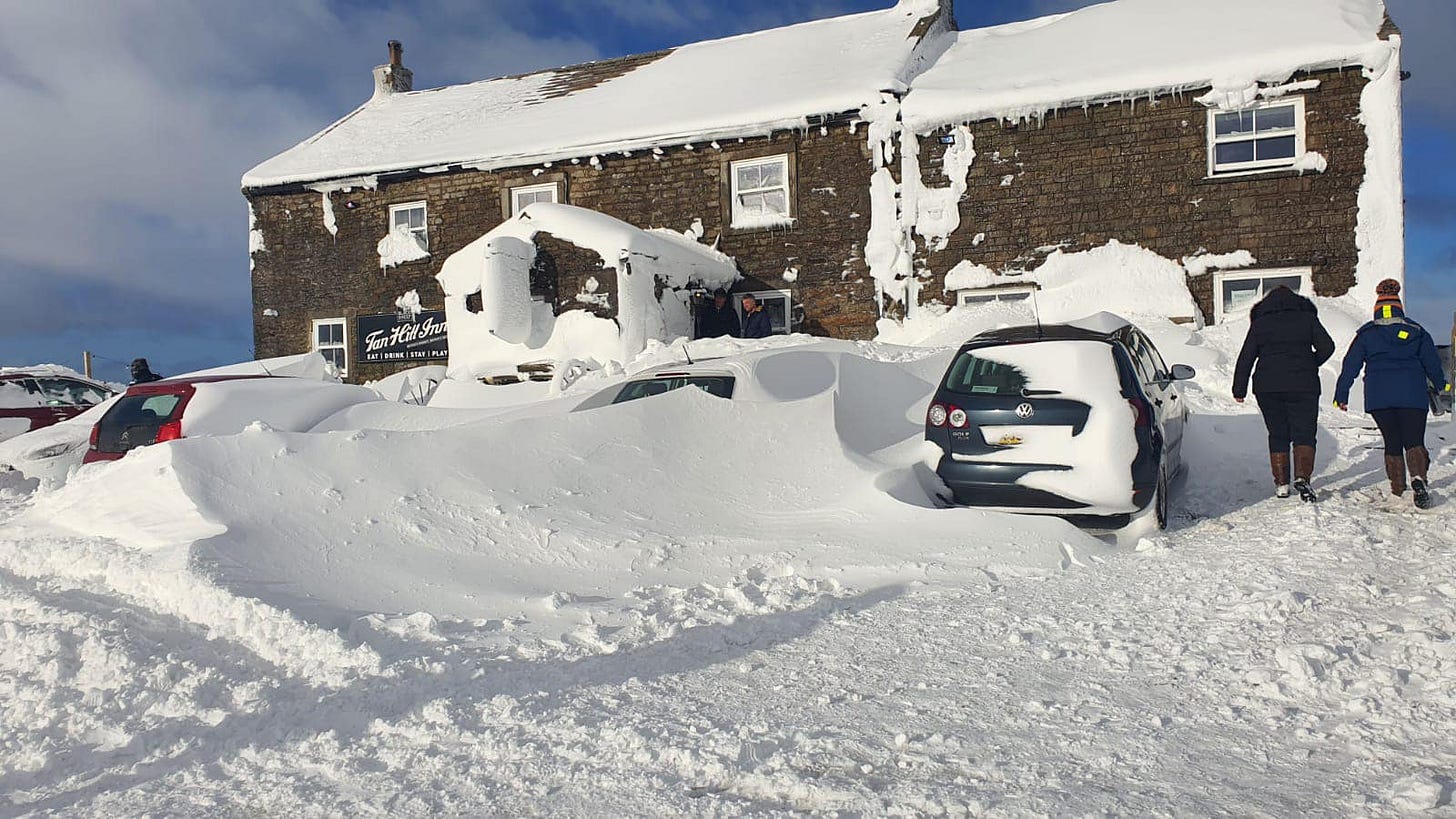Snow Job
How getting snowed in, drinking pints, and listening to an Oasis tribute band became a hope restorative
I’ve never been in the habit of reading good news. Mostly, because they don’t make very much of it. In fact, I’ve tried to cut back on my news consumption in recent years, other than doomsurfing the bare minimum for professional reasons: to force myself to hatch opinions about current events, in order to inflict those opinions on you, gentle reader. Other than that, I could take or leave it. When I read the news, I tend to do so like some people read obituaries – as catharsis. The same way dead people make others feel more alive, the world collapsing around me makes me feel like my own slightly-less tempestuous world might go on just a little while longer. It’s an approach I call “Comparative Apocalypse.” We’re all doomed, eventually, the mortality rate forever lodged at 100 percent. I’m just a little less immediately doomed than all the luckless bastards I’m reading about on the Drudge Report. Small victories count, too.
Yet I unwittingly tripped over a good-news story yesterday, moving across the wires, as the news-inclined like to say. According to the Associated Press, dozens of patrons who’d stopped in to drink at Tan Hill Inn in the Yorkshire Dales, Britain’s highest altitude pub which sits a good 1,732 feet above sea level, were trapped there by a severe blizzard, with drifts reported up to seven feet. The storm system killed three other people elsewhere. Did I say this was a good-news story? Bear with me. The felled power cables and blocked roads marooned 61 people in the inn’s pub for three nights, along with the Oasis tribute band they’d all originally come to hear, Noasis. There was no word on whether the fake Noel and Liam Gallagher – those perpetually feuding Oasis brothers – dropped their usual string of c-words (not “Christmas”), or insulted each other, as do their real-life counterparts. (Best all-time Noel insult of brother Liam: “He’s rude, arrogant, intimidating, and lazy. He’s the angriest man you’ll ever meet. He’s like a man with a fork in a world of soup.”)
Tan Hill Inn manager, Nicola Townsend, said that staff had organized movies, a quiz night, and karaoke for the inn’s stranded guests. There were drinking games. There were makeshift beds next to a roaring fire. They were even further entertained by Noasis. She said the pub’s guests were “in really good spirts.” (Being stuck in a pub, of all places, will do that for you – even if it’s a warm-beer British one.) “They’ve formed quite a friendship,” Townsend said. “Like a big family is the best way I can describe it. One lady actually said, ‘I don’t want to leave.’”
I thought this would be a nice, sleepy little story about a forgotten corner of the world having a pleasant snow day or three. Until I Googled it, and found it written up everywhere from the New York Times to CNN to Rolling Stone. It’s hard to get lost these days, even in an alcohol-fueled blizzard, without multi-platform coverage. Our overly-interconnected world always snakes its way in. Even the exuberant, snowbound hostages were committing their experiences to social media in real time, complete with voyeuristic commenters. “You made Russia news! My mate sent me a video earlier!” said one on the Tan Hill Inn’s Facebook page. “You need to have an online shop. You’d make a fortune on t shirts, etc….” said another.
It’s like the old tree-falling-in-a-forest conundrum. If you can’t Facebook, Instagram, or TikTok an experience, did it really happen? So often these days, our showcasing proof of experience is more essential than even having one. Without the naked exhibitionism, the pleasure for pleasure’s sake is practically beside the point.
And yet, I still enjoyed reading about it, living vicariously in the Tan Hill Inn’s snow globe. The stories revealed interesting things. The BBC reported that a tunnel had been dug out of the front door of the pub, but due to fallen power cables, the roads were still unpassable, which was just fine by the guests, since as one of them said, “plenty of beer” was still available. NPR relayed that despite the deprivation and endless Oasis karaoke, the inn stated on its Facebook page: “We will ALWAYS remember this group of amazing people who came together, and hopefully, in challenging circumstances, enjoyed what we all think was a life-changing experience.” Perhaps most important, New Musical Express informed us that the Oasis doppelgangers, Noasis, had even become a trending hashtag over the weekend: #Snowasis, the tribute-band equivalent of winning a Nobel Prize.
It was hard not to be struck by how many media outlets, and people generally, were enchanted by a simple snow-in story. Even with our recent COVID speed bump, have our lives now become so fast, that nature grabbing us by the scruff of our necks and stopping those lives for a while – with all their schedules and obligations and pressing concerns - fills us with both joy and envy, the latter of which is often a joy aspirant? It left me clinging to an old suspicion: that if you spend enough time in the world, there is something every bit as attractive in escaping it as there is in inhabiting it.
My own escape – or Snowasis, if you will – often comes each winter in the form of a book, one foisted on me by a casual acquaintance, to whom I’ll be forever grateful for doing so, as it’s now one of the most heavily underlined in my library. It’s written by the Michigan outdoors writer, Jerry Dennis, plenty of whose books I’d come to anyway, as a fisherman: A Place on the Water, The River Home, From a Wooden Canoe. I recommend all of them.
But there is none I recommend so highly as The Windward Shore. Every winter, when the days grow short, the temperatures drop, the fishing sucks, and the sun clocks out around 5 pm, with the world forcing us to be still for a few months, I find solace in the Four Elements: fire, music, words, and whiskey – four things that prove there is a God, and he loves his children.
After igniting the wood I spent all summer and fall splitting and drying, I sit down with a glass of Kentucky sunshine, and open my slim forest-green hardback edition of The Windward Shore with no dust jacket, re-acquainting myself with the highlights. Dennis, after being slowed by a knee injury, decided to spend a winter in a variety of abodes along the Great Lakes, including a log cabin on Lake Superior’s Keweenaw Peninsula. While there, as the book’s description has it, he contemplated solitude and time, “as well as weather, waves, ice and snow, books, birds, our complex and ever-changing relationship with nature—both human and wild.”
Like our Snowasis friends, Dennis is perpetually humbled, and pleasantly so, while relinquishing control and surrendering to forces larger than himself:
Of course we know that nature is anything but frivolous. We know it’s every physical thing and the laws they’re subject to – that it is the pith, not the fluff. It’s the ground we stand on. It’s the force that breaches the strongest city walls, and the unruliness that overwhelms our gardens. It is the night that terrifies us, the stars that mystify, the moon that bewitches. It’s the horrendous chasm and the sublime vista. It’s the green fuse burning at our core – and the red coal blowing in the secret dark center of our animal selves. It’s the state we’ve risen above and long to return to. It’s what made us and will one day kill us.
Nature’s power to crush or alter us is the very thing that demands our attention. For as Dennis writes:
It doesn’t notice us, so why should we notice it? Maybe it deserves our indifference – yet we’re unable to remain indifferent for long. It is boring – except when it is fascinating. Whether we pay attention or not is irrelevant. It charges through our cities, flattens our buildings, floods our streets, and of course it will drag us into the earth in the end. Just when we think we’ve made it unnecessary or surpassed it with our inventions or organized it neatly on a shelf, it leaps up and knocks us on our asses in the mud. And every now and then a hermit thrush will surprise us with its song and knock us on our asses that way, too.
Yet we acclimate ourselves, ceasing to be astonished by astonishing things:
Why aren’t we driven to our knees by scalloped snow drifts, by cats paws of wind on the water, by every word a child speaks? We grow immune to those things because time is both precious and a burden. We are easily bored and intolerant of boredom – a dangerous combination. It drives us to drink as surely as it drives us to cut down forests and invade nations. Ordinariness is the enemy. The resolute march of hours, long afternoons that dull our senses, the numbing repetitiveness of everyday routines and duties – anything that robs us of enchantment and drains the flavor from life. The feeling of wonder abandons us, and on many days we don’t feel much of anything.
I’ve never met Dennis, but I suspect he’d immediately understand the appeal of having nature reclaim us, even if it comes in the unlikely form of having to hole up for three days in a snowed-in pub, downing pints, and listening to covers of “Wonderwall” and “Champagne Supernova.” Sometimes, enforced simplicity is the only way we’ll come to know it:
Not only is simplicity unlikely, we don’t even want it. Not really. We’re too complicated, too restless, too excited by challenge and hungry for gain, too enamored with the results of our industriousness to enjoy for long the luxury of quiet hours and modest pleasures. We get bored. Pascal suggested that all our troubles arise from not knowing how to sit still. But few of us are willing to sit for long. Why should we? The moment we stop, we doubt. Besides, everyone knows that the rewards go to the industrious. Sit, and you get left behind. Rest, and you rust. And if you’re discontented with your life, at least you can say you got a lot done. ‘So passes the whole of life,’ whispers Pascal.
Of course, everyone who has the good sense to duck out of the world for a while, eventually gets accused of dodging it. But maybe their critics have it exactly backwards, Dennis suggests. Maybe they’re finding a way to more fully engage with it:
In certain moods I have claimed (and in certain moods it is true) that I would be content to spend the rest of my life considering the mysteries of sand and atoms. Once I expressed this to a friend and she threw her hands in the air in frustration. “But you’re hiding from life!” she said. “You’re losing yourself in nature to avoid the struggles of people!” I admitted that was part of it. But am I hiding from life, or seeking a richer one? Is “losing” oneself merely escapism – or its opposite: the way to a more fully realized life? What if getting lost in the physical world – and lost in work, play, love, music, books – allows us to live twice, three times, four times as much? Maybe those moments of immersion and abandonment clarify our thinking enough to ask why there is struggle in the first place, why there is sorrow, why there is anything at all. Probably there are no answers to those questions. But isn’t it crucial that we keep asking them? We construct our lives with every act we perform and every word we speak, and those acts and words are as various and abundant as nature, which spreads its seeds lavishly. That our lives are baffling and complicated and messy and magnificent and plagued with failures seems, at times, to make sense, to be right and fitting and perfect. For of course those same qualities describe the universe itself. I wanted sanctuary from the human world, so I went outside to be alone with the wind and water and sand and snow. I found clarity, myself, obscurity, nothing, and returned to my life a new man, an old man, a man of nature, a man of culture, a seasoned man, a sadder man.
I realize by now I’m indebted to Jerry Dennis for essentially writing the back half of this column. If the stars ever align, I guess I’ll buy him a pint, or take him to a Noasis concert. It’s the least I can do, not just for my column-cribbing, but for him writing a book that often restores my hope. For I have now lived long enough to know that hope-restoratives are rare enough that we should never slough them off when we encounter them. And we often don’t find them so much as they find us when we’re ready for them. They can come from anywhere – from slim volumes about a winter on the Great Lakes, from snowed-in pubs, hell, even from that often foul-mouthed lout/Noasis hero, Noel Gallagher himself, who once said when asked what advice he’d give his 25-year-old self:
Everything's gonna be fine. Stay optimistic. If there's dark clouds coming, they'll leave again. They always do. The world is round. Everything is round. The biggest invention of all time, the wheel, is round. Things pass, nothing will stay the same forever. No matter how big a pile of shite you've gotten yourself into-be it drugs, financial problems, fucked up relations-you will get over it. It will go away just like the weather. The sun is round, so is the planet we live on, as are marriage rings, and our eyes through which we see the world.
Bonus track: No disrespect intended to Noasis, but here is Oasis during happier times. Or relatively happier, since the Gallagher brothers were always at each other’s throats. (As Liam once memorably put it: “People think I'm just a f***ing lunatic, but Noel can be a little bitch, too. I am a tender, beautiful, and loving guy that happens to slap a photographer now and then because they get in my way.”) Though “Don’t Go Away” only charted in Canada and Japan, it remains one of Liam’s finest vocal performances.





1 word. Excellent.
Re: Hope-restoratives
"...we often don't find them so much as they find us when we're ready for them."
Sort of like that "unlikely magic" you spoke of a few weeks ago as you launched your classy little enterprise here. The kind of magic that "...when it happens, tends to happen on its own time, not ours."
Excellent insights, both. You wrote here that you'd "lived long enough" to recognize the rarity of these restorative blessings whenever they occur. And you are 100% right that we should "never slough them off" when they are encountered. Far too rare for that. Allow me to add something here. I've got a year or three on ya'. I figure I'm entitled. (Kidding. Mostly.)
I recall writing in a comment somewhere not too long ago (don't ask me where or about what; that year or three hasn't done anything for my memory) that good and evil are always present in our lives in this world, unseen possibilities waiting to be made real by the choices we make.
So it is with hope. It's always out there in the ether somewhere, just hanging around, waiting to be made real. And part of our "being ready" for those restorative gems to find us, whether they are large or small, is being prepared to choose. And choose wisely.
Thanks for the reminder. I'll be keepin' an eye peeled. Because after a lot of what's gone on in the world of late, I'm definitely ready.